The B2B Marketing Tools for Much-Needed Shortcuts
B2B marketing tools are everywhere today, but which ones are right for you? We've handpicked 10 different tools here that help with various aspects of marketing and hope they make your life a tiny bit easier as well.

B2B Marketing Tools That Your Bandwidth Will Thank You For
So much to do, with so little time. It’s almost a mantra for most digital marketers out there – especially the B2B ones. Not only do B2B marketers have to bring in leads, organize events and webinars, work on content and brand awareness but also help with automation and reporting to ensure that marketing and sales are working together in harmony and nothing is broken. Sales teams are not as common for B2C products so this last part is unique to B2B marketers.
And of course, a little help is always welcome, when there are so many hats on a marketer’s hat-rack today.
We’ve put together a list of top tools and the different functions they help satisfy. But before that, let’s quickly take a look at just a few things that B2B marketing tools can help with.
Self-Service Analytics and CRM – This is one of the primary areas where things get more specific to B2B. Make no mistake, CRM is very useful for B2C marketers as well, but B2B marketers can use the information in their database, with the help of a self-service analytics tool, to provide their sales teams with useful information, look at conversion rates between different stages of the marketing funnel and also track sales activity. It’s also extremely useful for designing tailored marketing campaigns and crafting a highly optimized sales process.
SEO – Let’s face it, there is no getting around SEO, Google currently has 92.18% of the world’s Search engine market share. It would be silly to not leverage all the traffic that Google is getting on a daily basis. But SEO today is even more complicated than it was just a few years ago. Google focuses on relevance and user experience, it’s not simply a matter of targeting a set of keywords and filling your blog post or landing page with them. You need to look at how popular your keyword is, and whether it is relevant to your business as well. Additionally, you need to create a blog post that adds a lot of value to those reading it – and this is measured by backlinks to a large extent. And finally, once that is done, you need to also top it up with a good CTA that aligns with the theme of the blog post as well as your product. Automation can definitely help you with the research aspect of SEO, which is really a big part of it ,and a tool like Grammarly, can even help with your writing style. This helps you make informed decisions and of course helps you save time.
Optimizing Ads- Back to Google again, since the search engine has so much traffic and SEO is a long term game, most marketers have some sort of ads running on Google so as to capitalize on the traffic. Along with Google, most people are spending their time on social media platforms on the internet – such as Instagram, Facebook, TikTok and more. Therefore it’s simply a must to advertise on all these platforms. But managing ads is a labour intensive task – often eating up a significant chunk of time. While fully automating ad optimization is not recommended, a tool can definitely help pick up the many signals from an AdWords account or a Meta account and make suggestions accordingly – signals which we can often tend to miss.
Graphic Design – Design is often a pain point for agencies and marketers alike. While most of us may not be adept at advanced tools like Photoshop, there are relatively simpler tools that can help us maximize our design talents (whatever little we have of them). This can come in handy for social posts, ad banners and more.
Website Performance – One of the primary jobs that marketers have is to conduct experiments, optimize landing pages and increase conversion rates. This can only be done if there is enough information on the performance of the landing page. There are a variety of solutions for this – ranging from Google’s free products to sophisticated products that allow you to even watch videos of how users behave once they land on your pages.
Without further ado, let’s look at some of the B2B marketing tools for CRM.
B2B Marketing Tools for Self Service Analytics and CRM
Veezoo: Starting off with a bit of a shameless plug here. Veezoo is a search-based self-service analytics tool that helps marketers get answers from data to every question they may have. Whether it is to design more targeted marketing campaigns that convert better or to understand customer usage patterns, you can just ask Veezoo. The reason behind the increased success is simply relevance. With a tool like Veezoo, obtaining a list of prospects that will respond better to your particular offer or campaign simply takes minutes. Or even understanding the pain points of your customers and helping them get the most out of your products and solutions.
The best part about Veezoo is that it works pretty much like a search engine – all you have to do in order to get your insights is to ask. Veezoo is designed to understand how humans ask questions and this is reflected in the ease of use and the Q&A interface the tool has. You can think of it as a SQL translator that eliminates the need for you to learn complicated syntax in order to get meaningful insights that enable you to make better decisions.
Here’s a quick video that shows how Veezoo can help you make sense of customer data in seconds.
As illustrated in the video, in just a few seconds, marketers can get the insights they need to design a targeted marketing campaign that will not only enhance customer experience, but will also help their sales team meet their upsell goals. Using traditional methods, that would have taken at least a couple of hours or even days. Veezoo enables marketers to accomplish this within a fraction of that time by themselves.
Hubspot: If you’re looking for a tool that helps you manage your sales, marketing and CRM all in one platform, then this comes pretty close to it. Hubspot is a great tool for lead management and reporting. Once your leads come into the system, Hubspot gives you a granular view in terms of where they came from and how they found you. This information also makes it easier for sales to work with these leads and customize their conversations with them.
Thereafter, sales can input the different stages and move them along the funnel which is easy to track. This also gives a good overview of conversion rate and sales activity.
Not only this, Hubspot is a great solution for sending out your emails and staying in touch with your customers as well so you don’t have to purchase another marketing automation product.
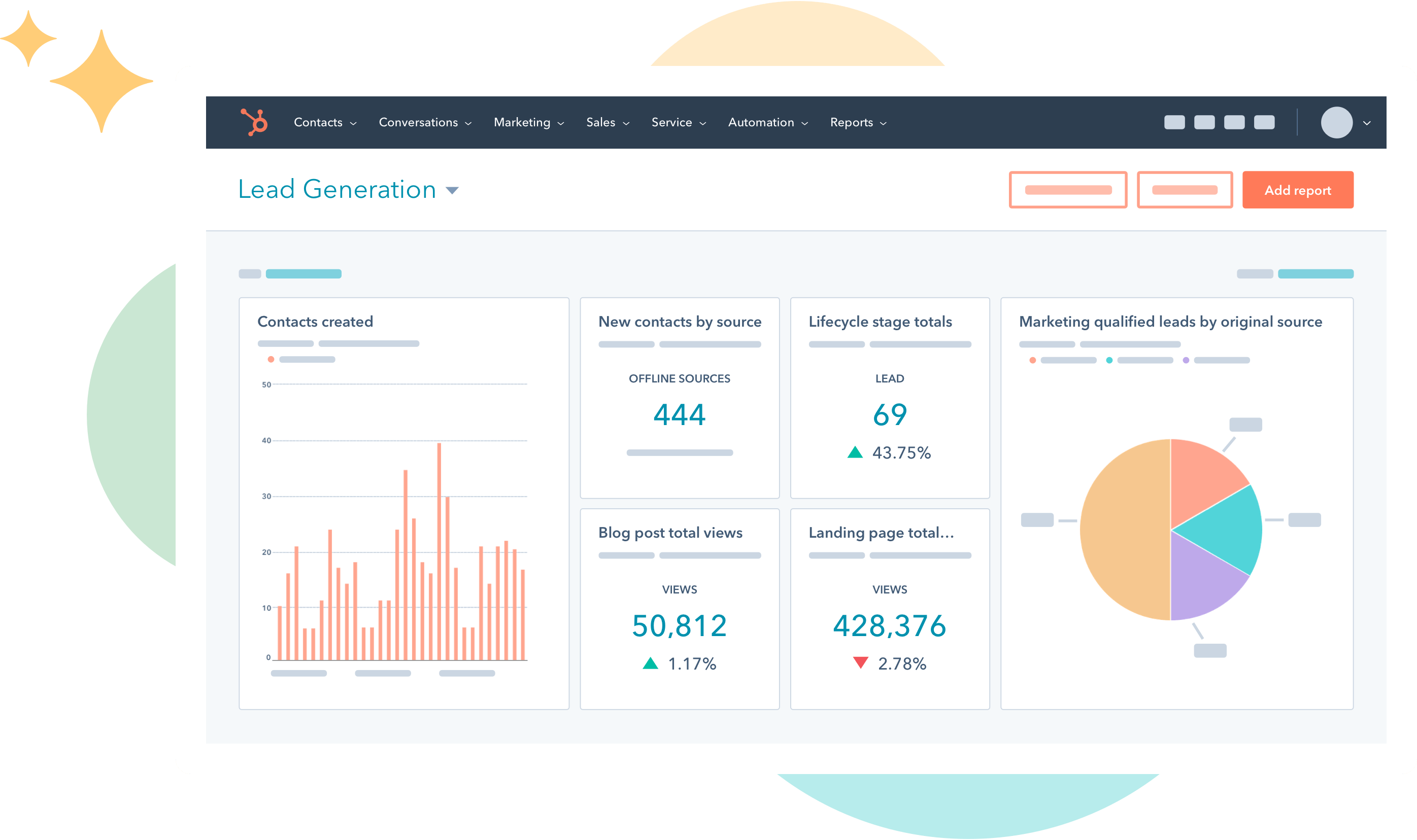
Image from Hubspot’s website
B2B Marketing Tools for SEO and Content
SEMrush: At Veezoo, we’re big fans of this tool. Not only does SEMrush make it easy for keyword research – to find that perfect balance of high volume and long tail keywords – it also displays Google’s SERPs for every keyword you’re looking for. That is a big plus since it helps you figure out who you’re contending with.
SEMrush not only gives an overview of the keywords, but also has great features for competitive research, keywords that you can use in your paid campaigns and also enables you to find and remove toxic backlinks. There are also more technical functionalities in the tool such as a tech and site audit that can be used to enhance the performance of the page on a more technical level such as speed etc.
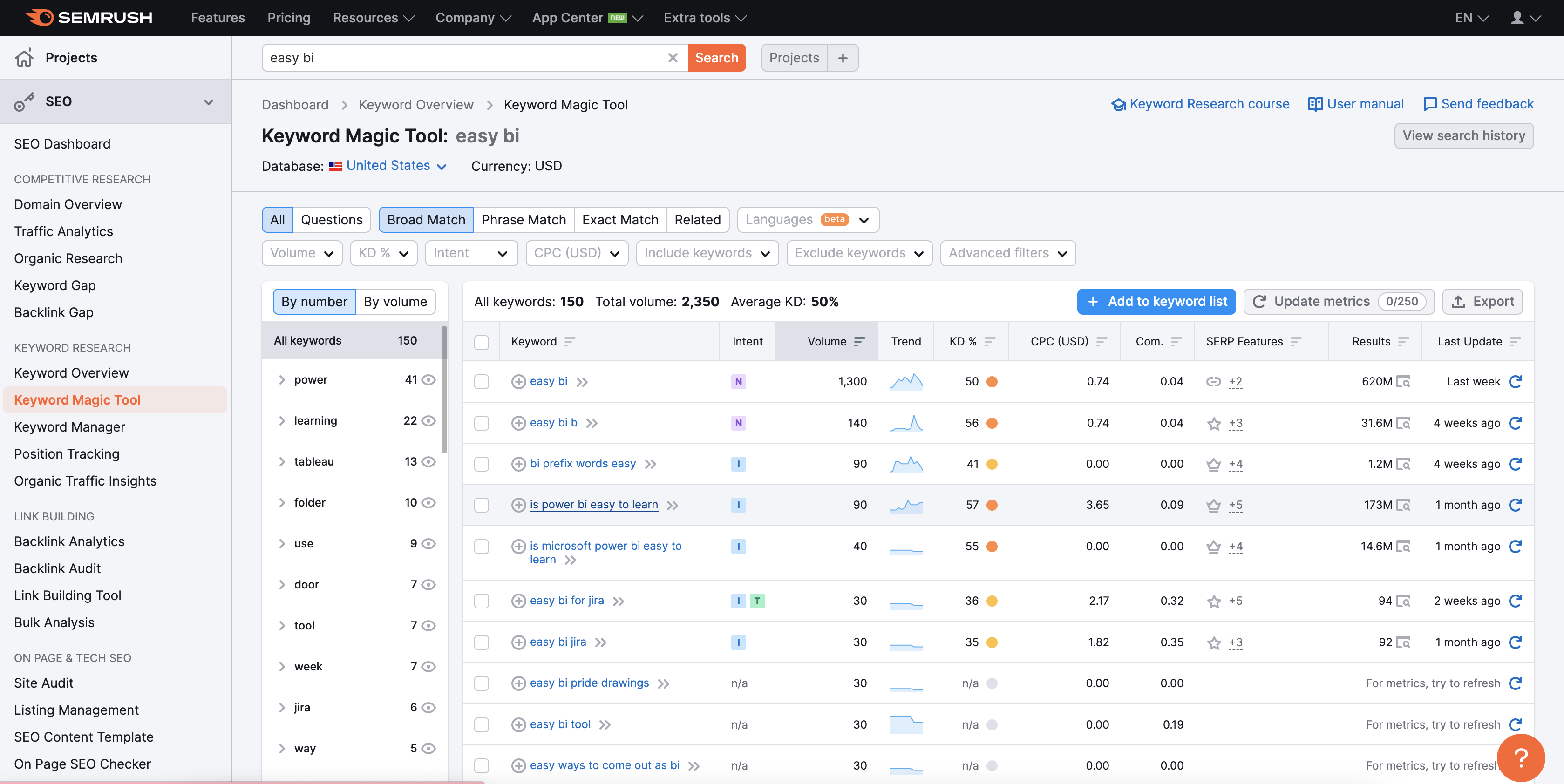
An image from our Semrush account showing keyword research
Frase: Looking for help with your SEO content? Frase is an AI powered all-in-one SEO tool which helps you perform competitive research, to see what your competitors are ranking for and focusing on. It then helps generate unique, long-form content with its AI powered technology and also provides feedback and tips for content you may have produced on your own, should you not wish to enlist their AI tool for writing your content. They also seem to be on Google Marketplace if you use Google Docs to generate your content.
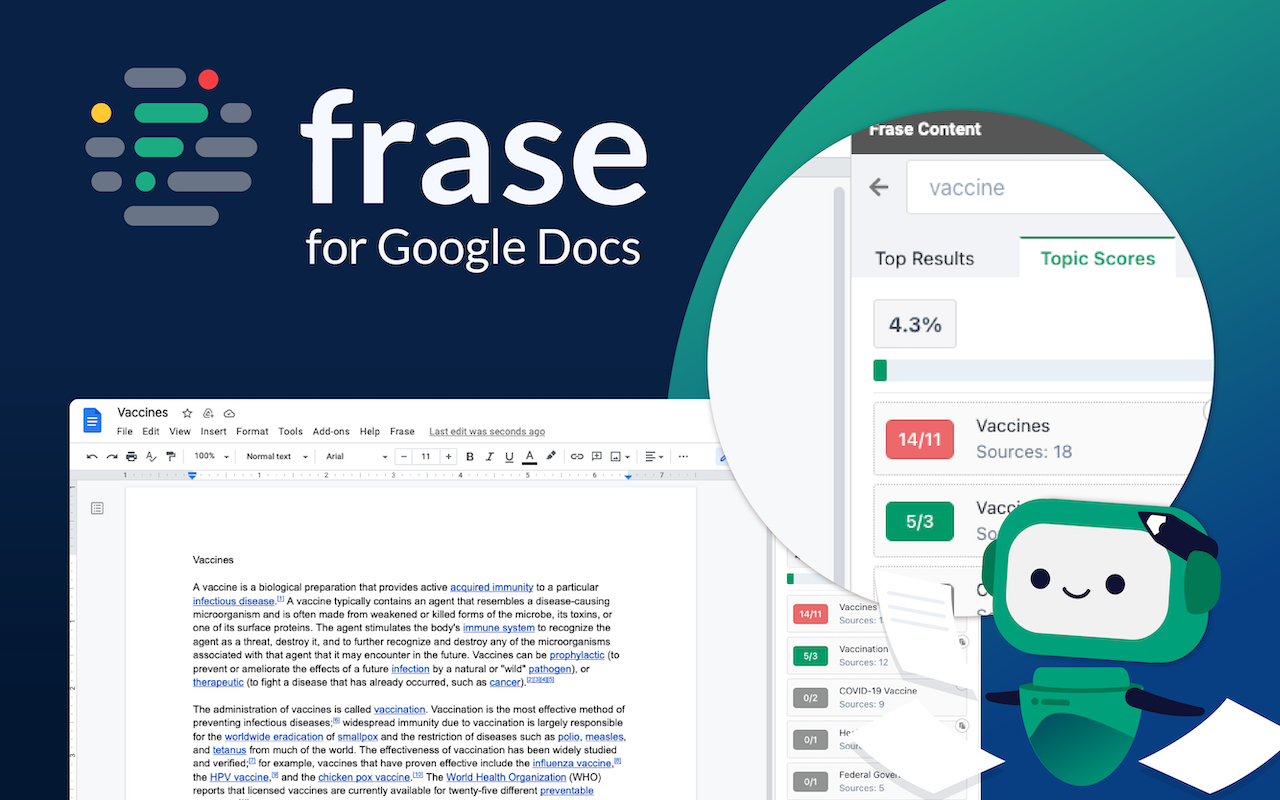
An Image from the Frase website
B2B Marketing Tools for Optimizing Ads
Opteo: If you’re looking for help to keep an eye on your AdWords account, Opteo is a pretty good bet. The way it works is it picks up signals from your ad account and makes suggestions to you accordingly. For instance if all your conversions are coming from people in the age range of 35+, Opteo will ask you to adjust your bids accordingly. Since AdWords has so many signals, it can often be hard to keep track of everything and Opteo helps with this. Additionally, most of the time, marketers are focused on the keywords and also the websites that ads are showing on (in the case of display ads). Opteo helps with optimizing the other, often overlooked parts of ad optimization. A word of caution though, using automation for Ad Optimization is great, but relying solely on it, is probably not wise.
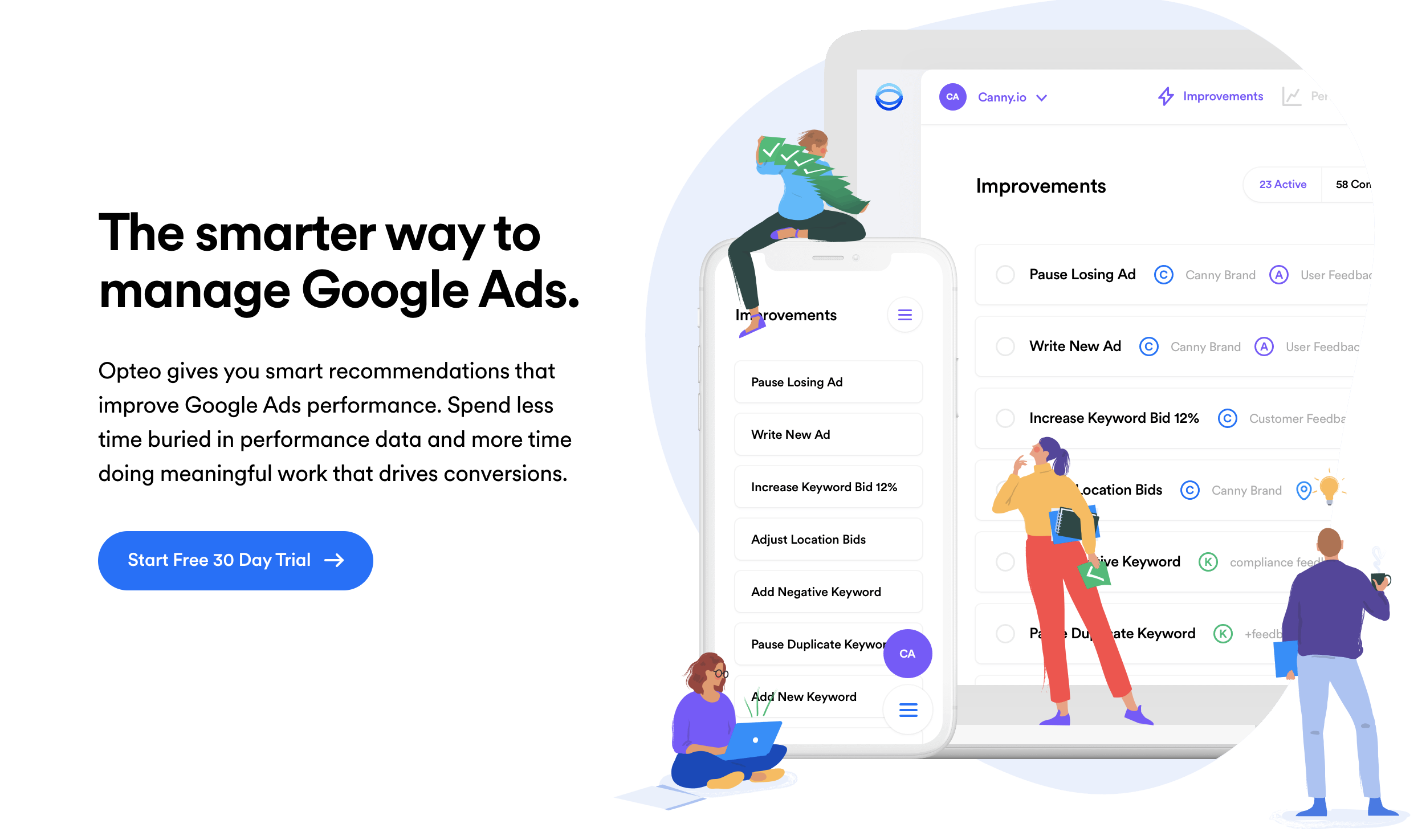
An image from Opteo’s website
Smartly: If you’re looking for a tool that helps automate ads on most social media platforms, then Smartly is definitely something you could check out – Smartly is able to help with ads on Meta, TikTok, Pinterest and Snapchat. What Smartly does is make social advertising scalable – which in this current environment of constantly changing rules and privacy regulations can be a big challenge. Smartly, like Opteo, uses algorithms to predict the best optimizations to make across different social media platforms in order to drive the most ROI.
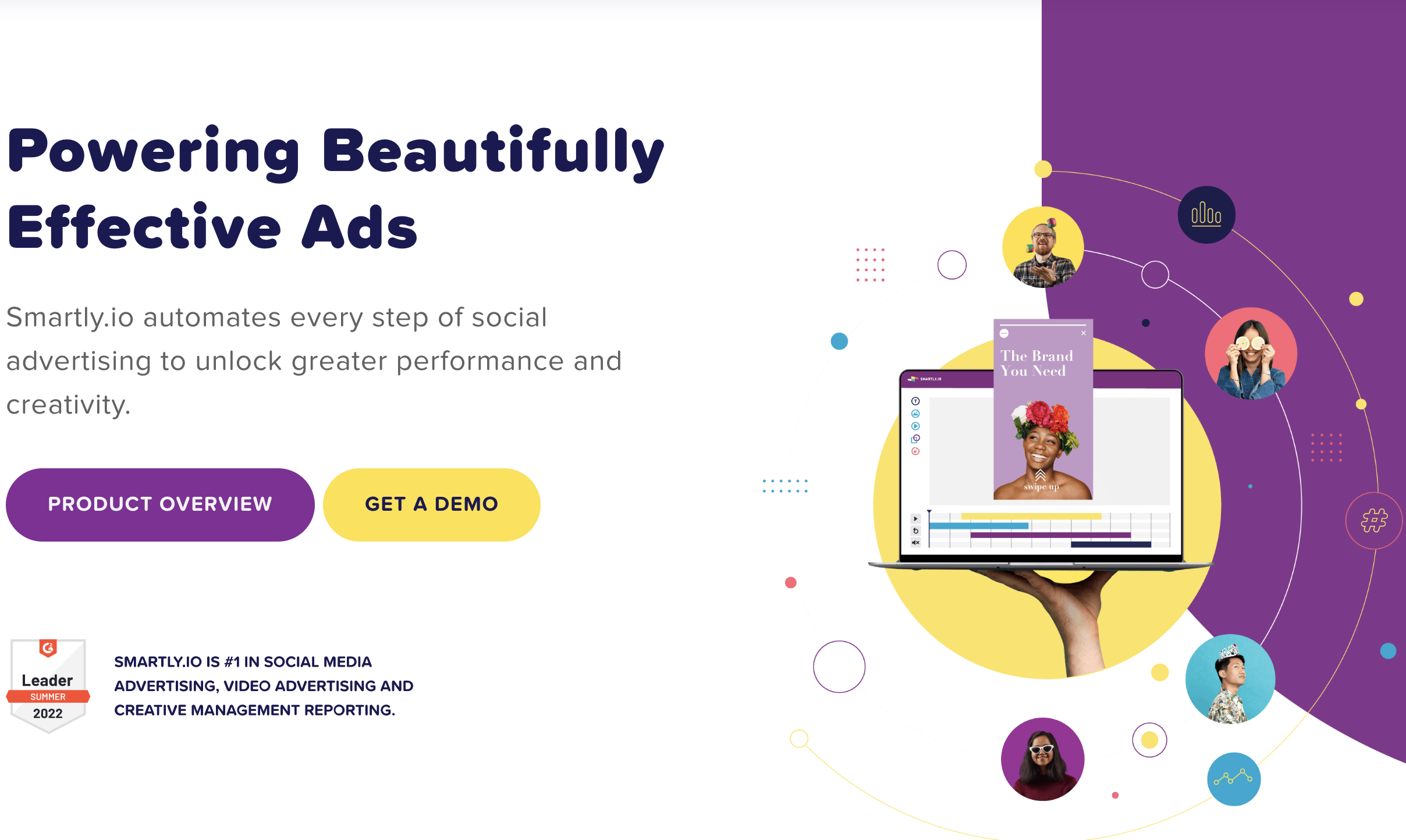
An image from Smartly’s website
B2B Marketing Tools for Graphic Design
Canva: A lot of us marketers know how to write compelling copy – what we don’t know is how to make beautiful images to go with the compelling copy. And in today’s highly visual world (it’s not even about images anymore, but video!), it’s very important to know how to create the right kind of images and videos to go with your content. Enter Canva – they even have a free plan!
Canva enables you to create simple images such as those you may need for a blog header, email headers or basic social ads quite easily. Sizing and resizing is not a problem and can be done in just a couple of clicks. Moreover, you can do basic edits such as place your pictures within different frames or shapes and add different backgrounds to your images if required.
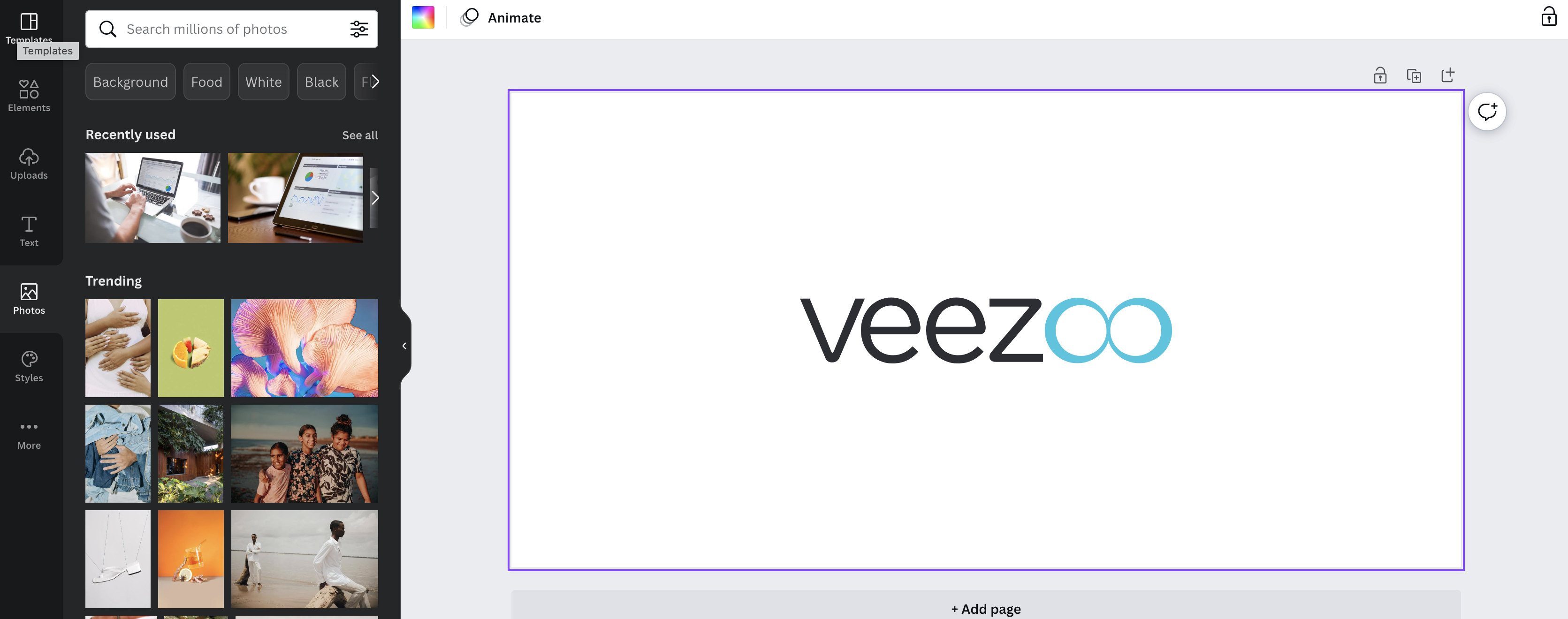
An image from our Canva account
Creatopy: (Formerly known as Bannersnack) If creating visual ads means waiting for days for your design team to get back to you, Creatopy is definitely a tool you can check out. What Creatopy does is help automate the creation of banner ads. It’s easy to get caught up in the back and forth when it comes to creative design. Creatopy has various solutions – depending on whether you’re a brand, enterprise or an agency, based on your needs and size.
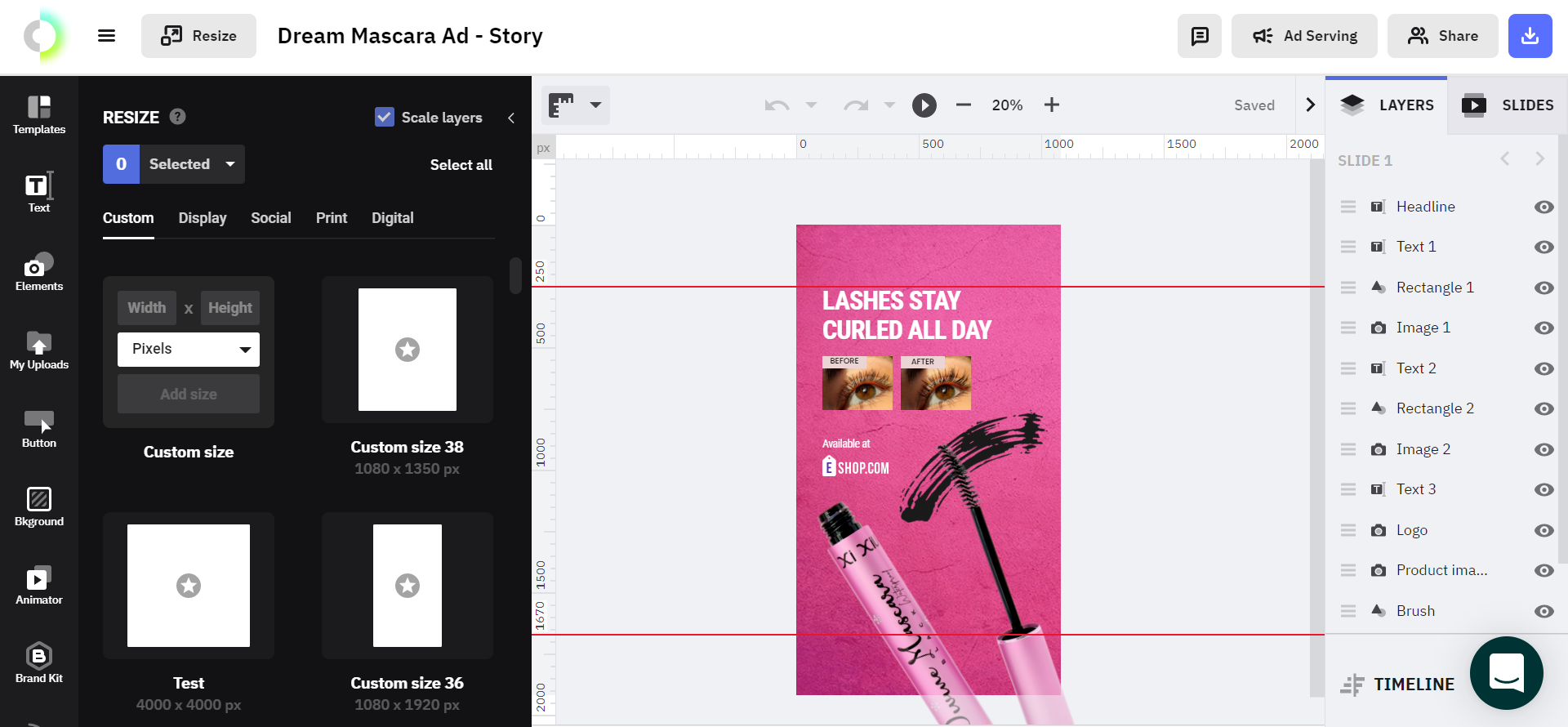
An image from Creatopy’s website
B2B Marketing Tools for Website Performance
Google Analytics: When it comes to data on how your website is performing, nothing beats Google Analytics. Analytics is a treasure trove of free information with a lot of functionalities. If you’re comfortable with it – the interface can be a little bit overwhelming at first – you can go deep into user behavior. For instance, you can find answers to questions such as what are the most common journeys users follow when they come to your website, or which blog posts have done well in the last quarter vs which ones haven’t , which conversion actions converted the most and more. Analytics is a really good (and free) source of information which can be put to good use by both B2B and B2C marketers.
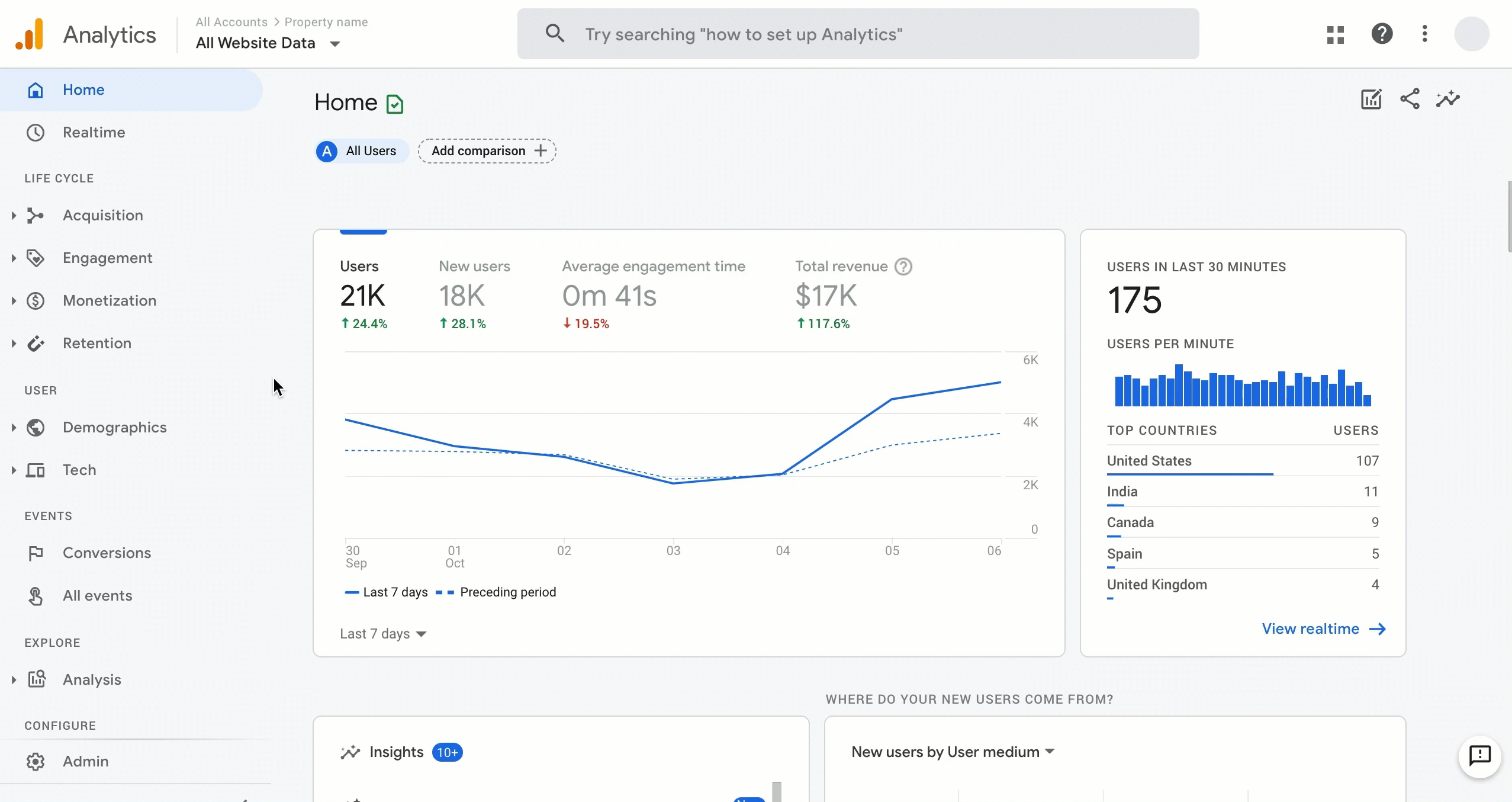
A quick preview of Google Analytics
Hotjar: Hotjar is a tool that enables users to get up close and personal with their website visitors. The tool not only allows you to visually see which parts of your website are easy to navigate/popular, but it also allows you to see individual videos of users that come to different pages of your website. In fact, in recent years, Hotjar also introduced the ability to collect feedback from website visitors so you can directly hear from them as to what’s working and what isn’t.
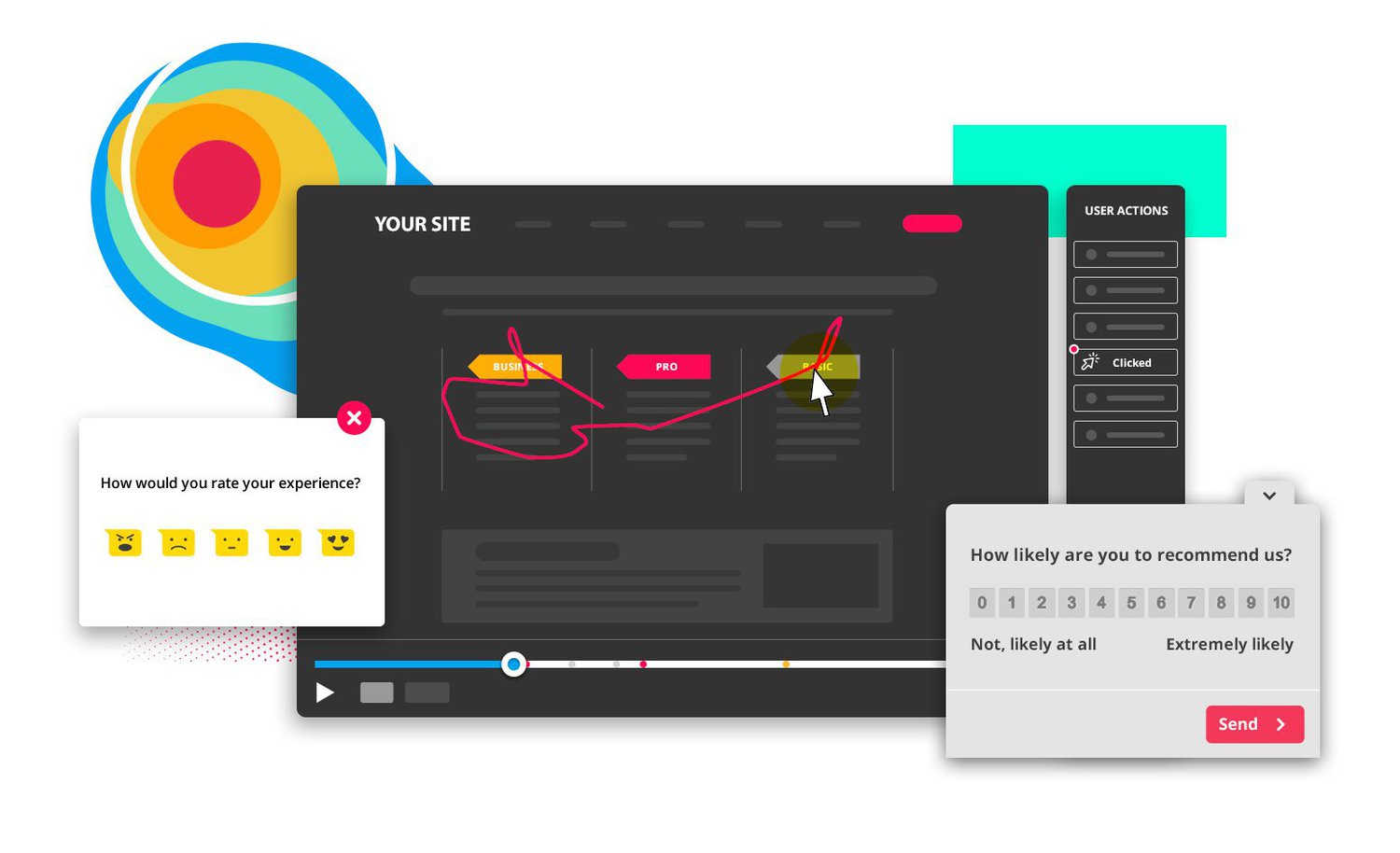
An image from Hotjar’s website
Those are just ten useful marketing tools for a variety of different functions. But there are many more depending on your specific needs and resource allocation.
But the main rule of thumb that should help you select any B2B marketing tool is how much better it makes your customer’s experience with your service or solution. At the end of the day, focusing on customer satisfaction or enhancing your customer’s interaction with your solution (even if they’re simply a prospect and not a customer) is what pays off in the long run. So pick your B2B marketing tools carefully!


